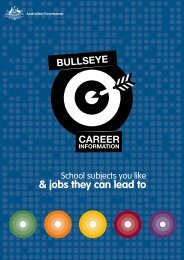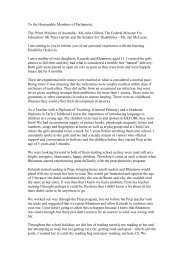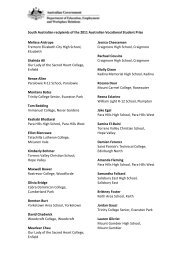Belonging, Being and Becoming - Early Years Learning Framework
Belonging, Being and Becoming - Early Years Learning Framework
Belonging, Being and Becoming - Early Years Learning Framework
Create successful ePaper yourself
Turn your PDF publications into a flip-book with our unique Google optimized e-Paper software.
LEARNING OUTCOMES<br />
OUTCOME 3: CHILDREN HAVE A STRONG SENSE OF WELLBEING<br />
Children take increasing responsibility for their own health <strong>and</strong> physical wellbeing<br />
This is evident, for example,<br />
when children:<br />
• recognise <strong>and</strong> communicate their bodily<br />
needs (for example, thirst, hunger, rest,<br />
comfort, physical activity)<br />
• are happy, healthy, safe <strong>and</strong> connected<br />
to others<br />
• engage in increasingly complex sensorymotor<br />
skills <strong>and</strong> movement patterns<br />
• combine gross <strong>and</strong> fi ne motor movement<br />
<strong>and</strong> balance to achieve increasingly complex<br />
patterns of activity including dance, creative<br />
movement <strong>and</strong> drama<br />
• use their sensory capabilities <strong>and</strong> dispositions<br />
with increasing integration,<br />
skill <strong>and</strong> purpose to explore <strong>and</strong> respond<br />
to their world<br />
• demonstrate spatial awareness <strong>and</strong> orient<br />
themselves, moving around <strong>and</strong> through their<br />
environments confi dently <strong>and</strong> safely<br />
• manipulate equipment <strong>and</strong> manage tools with<br />
increasing competence <strong>and</strong> skill<br />
• respond through movement to traditional <strong>and</strong><br />
contemporary music, dance <strong>and</strong> storytelling<br />
• show an increasing awareness of healthy<br />
lifestyles <strong>and</strong> good nutrition<br />
• show increasing independence <strong>and</strong><br />
competence in personal hygiene, care <strong>and</strong><br />
safety for themselves <strong>and</strong> others<br />
• show enthusiasm for participating in physical<br />
play <strong>and</strong> negotiate play spaces to ensure the<br />
safety <strong>and</strong> wellbeing of themselves <strong>and</strong> others<br />
Add your own examples from your context:<br />
32 BELONGING, BEING & BECOMING The <strong>Early</strong> <strong>Years</strong> <strong>Learning</strong> <strong>Framework</strong> for Australia<br />
Educators promote this learning,<br />
for example, when they:<br />
• plan for <strong>and</strong> participate in energetic<br />
physical activity with children, including<br />
dance, drama, movement <strong>and</strong> games<br />
• draw on family <strong>and</strong> community experiences<br />
<strong>and</strong> expertise to include familiar games <strong>and</strong><br />
physical activities in play<br />
• provide a wide range of tools <strong>and</strong><br />
materials to resource children’s fi ne <strong>and</strong><br />
gross motor skills<br />
• actively support children to learn<br />
hygiene practices<br />
• promote continuity of children’s personal<br />
health <strong>and</strong> hygiene by sharing ownership<br />
of routines <strong>and</strong> schedules with children,<br />
families <strong>and</strong> the community<br />
• discuss health <strong>and</strong> safety issues with children<br />
<strong>and</strong> involve them in developing guidelines to<br />
keep the environment safe for all<br />
• engage children in experiences,<br />
conversations <strong>and</strong> routines that promote<br />
healthy lifestyles <strong>and</strong> good nutrition<br />
• consider the pace of the day within the<br />
context of the community<br />
• model <strong>and</strong> reinforce health, nutrition <strong>and</strong><br />
personal hygiene practices with children<br />
• provide a range of active <strong>and</strong> restful<br />
experiences throughout the day <strong>and</strong><br />
support children to make appropriate<br />
decisions regarding participation





